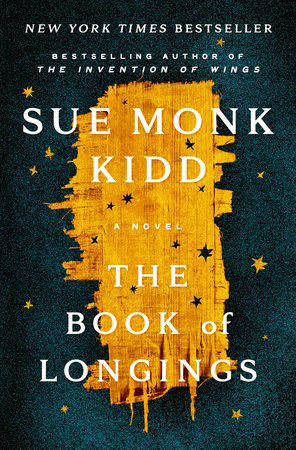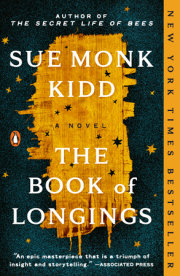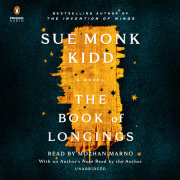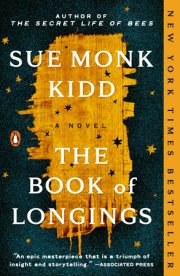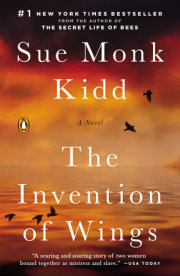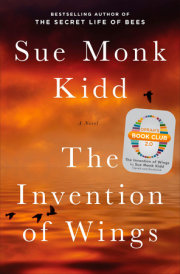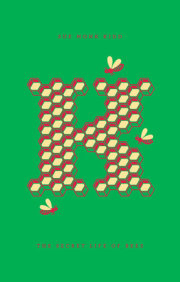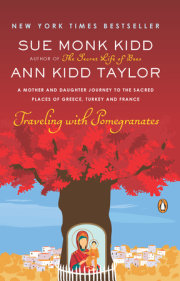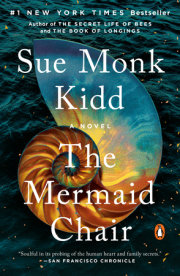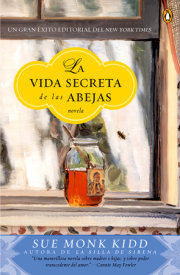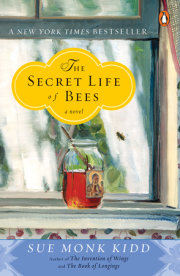i.
I am Ana. I was the wife of Jesus ben Joseph of Nazareth. I called him Beloved and he, laughing, called me Little Thunder. He said he heard rumblings inside me while I slept, a sound like thunder from far over the Nahal Zippori valley or even farther beyond the Jordan. I don't doubt he heard something. All my life, longings lived inside me, rising up like nocturnes to wail and sing through the night. That my husband bent his heart to mine on our thin straw mat and listened was the kindness I most loved in him. What he heard was my life begging to be born.
ii.
My testament begins in the fourteenth year of my life, the night my aunt led me to the flat roof of my father's grand house in Sepphoris, bearing a plump object wrapped in linen.
I followed her up the ladder, eyeing the mysterious bundle, which was tied on her back as if it were a newborn baby, unable to guess what she secreted. She was humming a Hebrew song about Jacob's ladder, doing so rather loudly, and I worried the sound would tumble through the slit windows of the house and awaken my mother. She had forbidden us to go to the roof together, afraid Yaltha would fill my head with audacities.
Unlike my mother, unlike every woman I knew, my aunt was educated. Her mind was an immense feral country that spilled its borders. She trespassed everywhere. She had come to us from Alexandria four months ago for reasons of which no one would speak. I'd not known my father had a sister until she'd appeared one day dressed in a plain, undyed tunic, her small body erect with pride, eyes glowering. My father didn't embrace her, nor did my mother. They gave her a servant's room that opened onto the upper courtyard, and they ignored my interrogations. Yaltha, too, avoided my questions. "Your father made me swear not to speak of my past. He would rather you think I dropped from the sky in the manner of bird shit."
Mother said Yaltha had an impudent mouth. For once, we were in agreement. My aunt's mouth was a wellspring of thrilling and unpredictable utterances. It was what I most loved about her.
Tonight was not the first time we'd sneaked to the roof after dark to escape prying ears. Huddled beneath the stars, my aunt had told me of Jewish girls in Alexandria who wrote on wooden tablets that contained multiple wax slates, contraptions I could scarcely imagine. She'd recounted stories of Jewish women there who led synagogues, studied with philosophers, wrote poetry, and owned houses. Egyptian queens. Female pharaohs. Great Goddesses.
If Jacob's ladder reached all the way to heaven, so, too, did ours.
Yaltha had lived no more than four and a half decades, but already her hands were becoming knotted and misshapen. Her skin lay in pleats on her cheeks and her right eye drooped as if wilted. Despite that, she moved nimbly up the rungs, a graceful climbing spider. I watched as she hoisted herself over the top rung onto the roof, the pouch on her back swinging to and fro.
We settled on grass mats, facing each other. It was the first day of the month of Tishri, but the cool fall rains had not yet come. The moon sat like a small fire on the hills. The sky, cloudless, black, full of embers. The smell of pita and smoke from cook fires drifted over the city. I burned with curiosity to know what she concealed in her bundle, but she gazed into the distance without speaking and I forced myself to wait.
My own audacities lay hidden inside a carved cedar chest in a corner of my room: scrolled papyri, parchments, and scraps of silk, all of which bore my writings. There were reed pens, a sharpening knife, a cypress writing board, vials of ink, an ivory palette, and a few precious pigments my father had brought from the palace. The pigments were mostly gone now, but theyÕd been luminous the day IÕd opened the lid for Yaltha.
My aunt and I had stood there gazing down at all that glory, neither of us speaking.
She reached into the chest and pulled out parchments and scrolls. Not long before she arrived, I'd begun writing down the stories of the matriarchs in the Scriptures. Listening to the rabbis, one would've thought the only figures worth mention in the whole of history were Abraham, Isaac, Jacob, and Joseph . . . David, Saul, Solomon . . . Moses, Moses, Moses. When I was finally able to read the Scriptures for myself, I discovered (behold!) there were women.
To be ignored, to be forgotten, this was the worst sadness of all. I swore an oath to set down their accomplishments and praise their flourishings, no matter how small. I would be a chronicler of lost stories. It was exactly the kind of boldness Mother despised.
On the day I opened the chest for Yaltha, I had completed the stories of Eve, Sarah, Rebekah, Rachel, Leah, Zilpah, Bilhah, and Esther. But there was so much remaining to be written-Judith, Dinah, Tamar, Miriam, Deborah, Ruth, Hannah, Bathsheba, Jezebel.
Tensed, almost breathless, I watched my aunt pore over my efforts.
"It's as I thought," she said, her face candescent. "You've been greatly blessed by God."
Such words.
Until that moment I'd thought I was merely peculiar-a disturbance of nature. A misfit. A curse. I'd long been able to read and write, and I possessed unusual abilities to compose words into stories, to decipher languages and texts, to grasp hidden meanings, to hold opposing ideas in my head without conflict.
My father, Matthias, who was head scribe and counselor to our tetrarch, Herod Antipas, said my talents were better suited for prophets and messiahs, for men who parted seas, built temples, and conferred with God on mountaintops, or for that matter, any common circumcised male in Galilee. Only after I taught myself Hebrew and cajoled and pleaded did he allow me to read the Torah. Since the age of eight, I'd begged him for tutors to educate me, scrolls to study, papyrus to write on, and dyes to mix my own inks, and he'd often complied-whether out of awe or weakness or love, I couldn't say. My aspirations embarrassed him. When he couldn't subdue them, he made light of them. He liked to say the only boy in the family was a girl.
A child as awkward as I required an explanation. My father suggested that while God was busy knitting me together in my mother's womb, he'd become distracted and mistakenly endowed me with gifts destined for some poor baby boy. I don't know if he realized how affronting this must have been to God, at whose feet he laid the blunder.
My mother believed the fault lay with Lilith, a demon with the talons of an owl and the wings of a carrion bird who searched for newborn babies to murder, or in my instance, to defile with unnatural tendencies. I'd arrived in the world during a savage winter rain. The old women who delivered the babies refused to venture out even though my high-ranking father had sent for them. My distraught mother sat on her birthing chair with no one to relieve her pain or protect us from Lilith with the proper prayers and amulets, so it was left to her servant Shipra to bathe me in wine, water, salt, and olive oil, wrap me in swaddling bands, and tuck me into a cradle for Lilith to find.
My parents' stories found their way into the flesh of my flesh and the bone of my bone. It had not occurred to me that my abilities had been intended, that God had meant to bestow these blessings on me. On Ana, a girl with turbulent black curls and eyes the color of rainclouds.
Voices floated from nearby rooftops. The wail of a child, a goat bleating. Finally, Yaltha reached behind her back for the bundle and unwrapped the linen cloth. She peeled away the layers slowly, her eyes alight, casting quick glances at me.
She lifted up the contents. A limestone bowl, glowing and round, a perfect full moon. "I brought it with me from Alexandria. I wish you to have it."
When she placed it in my hands, a quiver entered my body. I ran my palms over the smooth surface, the wide mouth, the milky whorls in the stone.
"Do you know what an incantation bowl is?" she asked.
I shook my head. I only knew it must be something of great magnitude, something too perilous or wondrous to unveil anywhere except on the roof in the dark.
"In Alexandria we women pray with them. We write our most secret prayer inside them. Like this." She placed a finger inside the bowl and moved it in a spiraling line around the sides. "Every day we sing the prayer. As we do, we turn the bowl in slow circles and the words wriggle to life and spin off toward heaven."
I gazed at it, unable to speak. A thing so resplendent, so fraught with hidden powers.
She said, "At the bottom of the bowl, we draw an image of ourselves to make certain God knows to whom the petition belongs."
My mouth parted. Surely she knew no devout Jew would look upon figures in human and animal form, much less create them. The second commandment forbade it. Thou shalt not make a graven image of anything living in heaven, or on the earth, or in the sea.
"You must write your prayer in the bowl," my aunt told me. "But take care what you ask, for you shall surely receive it."
I stared into the hollow of the vessel and for a moment it seemed like a firmament unto itself, the starry dome turned upside down.
When I looked up, Yaltha's eyes were settled on me. She said, "A man's holy of holies contains God's laws, but inside a woman's there are only longings." Then she tapped the flat bone over my heart and spoke the charge that caused something to flame up in my chest: "Write what's inside here, inside your holy of holies."
Lifting my hand, I touched the bone my aunt had just struck to life, blinking furiously to hold back a tumult of emotion.
Our one true God dwelled inside the Holy of Holies in the Temple at Jerusalem, and I was sure it was impious to speak of a similar place existing inside humans, and worse still to suggest that yearnings inside girls like me had intimations of divinity. It was the most beautiful, wicked blasphemy I'd ever heard. I could not sleep that night for the ecstasy of it.
My bedstead was lifted off the floor on bronze legs, swathed in pillows dyed crimson and yellow, stuffed with beaten straw, feathers, coriander, and mint, and I lay there in all that softness and those scents long past the midnight hour composing my prayer in my head, struggling to compress the vastness of what I felt into words.
Rousing before dawn, I crept along the balcony that overhung the main floor, moving in bare feet without a lamp, stealing past the rooms where my family slept. Down the stone steps. Through the portico of the reception hall. I crossed the upper courtyard, measuring my steps as if walking on a field of pebbles, fearful of waking the servants who slept nearby.
The mikvah where we bathed in keeping with the laws of purity was enclosed in a dank room beneath the house and was accessible only from the lower courtyard. I descended, feeling my way along the stair wall. As the trickle of water in the conduit rose and the gloom faded, I made out the contours of the pool. I was adept at performing my ritual ablutions in the dark-I'd been coming to the mikvah since my first bleeding, as our religion required, but doing so at night, in private, for I'd not yet confessed my womanhood to my mother. For several months now I'd been burying my rags in the herb garden.
This time, though, I'd not come to the mikvah for reasons of womanhood, but to make myself ready to inscribe my bowl. To write down a prayer-this was a grievous and holy thing. The act itself of writing evoked powers, often divine, but sometimes unstable, that entered the letters and sent a mysterious animating force rippling through the ink. Did not a blessing carved on a talisman safeguard a newborn and a curse inscription protect a tomb?
I slipped off my robe and stood unclothed on the top step, though it was customary to enter in one's undergarments. I wished to be laid bare. I wished nothing between me and the water. I called out for God to make me clean so I might write my prayer with rightness of mind and heart. Then I stepped into the mikvah. I wriggled beneath the water like a fish and came up gasping.
Back in my room I robed myself in a clean tunic. I gathered the incantation bowl and my writing implements and lit the oil lamps. Day was breaking. A blurred blue light filled the room. My heart was a goblet running over.
Copyright © 2020 by Sue Monk Kidd. All rights reserved. No part of this excerpt may be reproduced or reprinted without permission in writing from the publisher.

